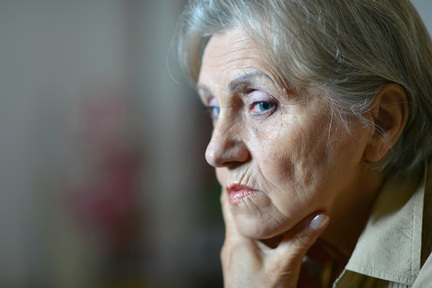Half of older people experiencing loneliness suffer in silence
Almost three-quarters of older people describe themselves as lonely and more than half of those have never spoken to anyone about how they feel, new research suggests.

A survey carried out by the over-50s social networking site Gransnet, revealed that 93 per cent of users admit it is possible to feel lonely even when you have a partner or family, with 82 per cent agreeing that talking about feelings of loneliness is much easier when they are online and anonymous.
Caroline Abrahams, charity director at Age UK, said: "The impact of loneliness can be devastating and while there is no quick fix, there are reasons to believe that we can all do something to change things for the better: a simple thing like saying hello and having a chat can brighten up an older person’s day and do more good than most of us would ever guess."
Commission to shine spotlight on older people
Gransnet is one of nine organisations - Age UK, Alzheimer’s Society, British Red Cross, Campaign to End Loneliness, Eden Project Communities, Independent Age, Royal Voluntary Service and The Silver Line – working to address the issue of loneliness in older people, which is the current focus of the Jo Cox Commission on Loneliness, set up before her death last year.
The Commission on Loneliness is placing a spotlight on older people from 20 March – 23 April and is urging individuals and businesses to 'take action' against chronic isolation in later life, which is experienced by more than 1.2 million older people.
The nine organisations are asking their supporters and followers to post #happytochat on their Twitter and Facebook status to create online chatter around loneliness and encourage people across all generations to be aware of the loneliness that can often be found but only behind closed doors.
While loneliness can strike at any age, older people are at higher risk of being lonely as they are more likely to experience deteriorating health and the death of a loved one. Disability, poor health, poverty and limited access to transport can contribute to older people feeling cut off from their family, friends and local communities, meaning many older people have little or no social interaction.
The closures of bank branches, post offices, small shops and libraries, particularly in rural areas, can also be ‘devastating’ for many older people who rely on them for social contact, exacerbating their feelings of being forgotten and lonely.
Loneliness is a silent epidemic
Under the slogan 'Start a Conversation', the Commission wants to mobilise the public to help themselves and others around them – educating people on how they can become part of the solution – whether through talking to a neighbour, visiting an old friend, or just making time for people they meet.
The chairs of the cross-party Commission, Labour MP Rachel Reeves and Conservative MP Seema Kennedy, said there was a stigma around loneliness that must be tackled.
"Loneliness is a silent epidemic across the UK. We all need to act and encourage older people to talk freely about their loneliness.
"Everyone can play a part to ending loneliness among older people in their communities by simply starting a conversation with those around you. Building awareness, being the 'eyes on the ground' to spot it amongst older customers, patients, friends, relatives and neighbours, and refer onto people who can help are all interventions that could make a real impact to a lonely older person’s life.
"How we care and act for those around us could mean the difference between an older person just coping, to them loving and enjoying later life."
Small steps
Lara Crisp, editor of Gransnet, added: "We know from our forums what an enormous difference it makes for people to know that there is always someone out there they can turn to, whether it's for support, advice or just a chat about nothing in particular.
"We are delighted to partner with the Jo Cox Loneliness Commission to help ensure that everybody who wants or needs it has someone they can talk to online at any hour of the day or night."
David McCullough, chief executive of Royal Voluntary Service, commented: "Real relationships and human contact is what’s needed to make older people feel less lonely. If we each take a small step to help an older person alone – a visit to a friend or relative for a quick cup of tea – we can make a huge difference to the lives of older people in our communities.
"Through the work of the Commission, we want to inspire the public to start a conversation and help put an end to this growing epidemic."
Latest News
 29-Jul-24
Dementia Bus gives carehome.co.uk staff insight into life with dementia
29-Jul-24
Dementia Bus gives carehome.co.uk staff insight into life with dementia
 27-Jul-23
UK's top home care agencies in 2023 revealed
27-Jul-23
UK's top home care agencies in 2023 revealed
 30-Nov-22
A quarter of older people keep their falls secret from family
30-Nov-22
A quarter of older people keep their falls secret from family
 29-Nov-22
'Covid-19 has not gone away' say terminally ill
29-Nov-22
'Covid-19 has not gone away' say terminally ill
 28-Nov-22
IT consultant who received poor care opens 'compassionate' home care business
28-Nov-22
IT consultant who received poor care opens 'compassionate' home care business